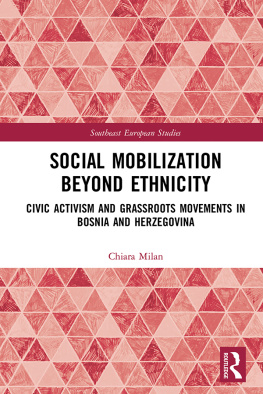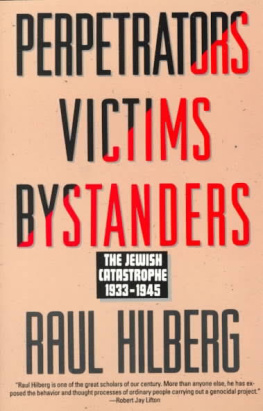
Social Aspects of Memory
Social Aspects of Memory presents a compelling study of how ordinary people remember war. Whilst the book focuses on the cities of Sarajevo and East Sarajevo during the 19921995 war in Bosnia-Herzegovina, Jefti also presents narratives from other war-torn cities and countries around the world. This book adopts a unique approach, by looking at how perpetrators and victims (as well as new generations who may not remember the war directly) manage in the aftermath of war. Jefti explores how our memories of war and violence are formed, and how we can learn to reconcile those memories, individually and as a collective.
Drawing on the authors own extensive empirical research, the book explores the connections between memories of significant war events, transgenerational transmission of memories, bias for in-group wrongdoings and readiness for reconciliation between two groups.
Giving a voice to underrepresented narratives and prioritising the importance of expression as a necessary catalyst for reconciliation, this book is essential reading for those interested in collective and transgenerational memory and memory studies, especially in relation to the aftermath of the 19921995 war in Bosnia-Herzegovina.
Alma Jefti is a PhD candidate in psychology at the University of Belgrade, Serbia; President of the Association of Psychologists in the Federation of Bosnia-Herzegovina Sarajevo Subsidiary; and a Governing Board member of the Research Network on Transnational Memory and Identity in Europe (Council for European Studies at Columbia University).
First published 2019
by Routledge
2 Park Square, Milton Park, Abingdon, Oxon OX14 4RN
and by Routledge
52 Vanderbilt Avenue, New York, NY 10017
Routledge is an imprint of the Taylor & Francis Group, an informa business
2019 Alma Jefti
The right of Alma Jefti to be identified as author of this work has been asserted by her in accordance with sections 77 and 78 of the Copyright, Designs and Patents Act 1988.
All rights reserved. No part of this book may be reprinted or reproduced or utilised in any form or by any electronic, mechanical, or other means, now known or hereafter invented, including photocopying and recording, or in any information storage or retrieval system, without permission in writing from the publishers.
Trademark notice: Product or corporate names may be trademarks or registered trademarks, and are used only for identification and explanation without intent to infringe.
British Library Cataloguing-in-Publication Data
A catalogue record for this book is available from the British Library
Library of Congress Cataloging-in-Publication Data
Names: Jeftic, Alma, author.
Title: Social aspects of memory : stories of victims and perpetrators from
Bosnia-Herzegovina / Alma Jeftic.
Description: 1 Edition. | New York : Routledge, 2020.
Identifiers: LCCN 2019006995 | ISBN 9780415789554 (hardback) |
ISBN 9781315222677 (ebook)
Subjects: LCSH: MemorySocial aspects.
Classification: LCC BF378.S65 J44 2019 | DDC 153.1/2dc23
LC record available at https://lccn.loc.gov/2019006995
ISBN: 978-0-415-78955-4 (hbk)
ISBN: 978-1-315-22267-7 (ebk)
Typeset in Times New Roman
by Apex CoVantage, LLC
To all those who have the courage to listen and to take the step towards understanding
At the very beginning I would like to emphasise something: this book is not only about Bosnia-Herzegovina. It is not only about Sarajevo and East Sarajevo. It is about all those people from Bosnia-Herzegovina, Sarajevo, East Sarajevo and other war-torn cities and countries around the world. It is written with two goals: to understand how our memories of past wrongdoings are formed, and to teach us how to reconcile those memories. It takes not only two persons to reconcile, but two persons and two different narratives that they produce. When we move this to the group level, we have two (or sometimes even more) collective narratives that clash.
We live in a world that pushes us to take one side or the other, and, while doing so, to accept our side as the best in all aspects, even when it insults the other. Through this book I tried to give a voice to those underrepresented ordinary people who survived the terrible war, and those a bit younger, who did not survive it in person, but still feel its consequences. Being a psychologist who prefers quantitative over qualitative methods, I was astonished by the fact that in this case narratives tell more when neither quantified nor converted into numbers. I truly appreciate the strength of each voice I heard during a pretty long period of fieldwork, and I am very thankful for the time all those people devoted to me.
Today, more than 20 years after the war, people are still having trouble talking about the difficult past. Our job as psychologists and peace activists is to provide them the opportunity to say what they think to express their emotions and traumas. I truly believe that listening is a royal road to reconciliation in situations like this. Therefore, this book, which tells a bit more about social aspects of remembering, bias in memories for in-group wrongdoings, and readiness for reconciliation is a sort of manual of listening for beginners, and all those who would like to practise this virtue in their settings, regardless of where they live.
I truly believe that being judgemental wont pave the road to reconciliation. However, developing historical empathy through listening and learning can direct us towards that important road. If some of the lines written in this book can help us move towards that track even slightly, its major aim will be achieved.
It would take another book to name all the wonderful human beings who helped me during my fieldwork and, later, the writing process. Perhaps I will remain indebted to most of them, and the only thing I can do is to continue working towards reconciliation while having them on my mind.
First of all, I would like to thank the professors from the Department of Psychology at the University of Belgrade for their endless support, especially my thesis supervisor, Prof. Dr Dragan Popadi. Also, I would like to thank the professors from the Institute of Psychology, University of Graz, where I spent one academic year as a Go Styria scholarship student. A big thank you goes to Prof. Dr Rupert Brown and social psychology doctoral students from the School of Psychology, University of Sussex, where I spent a shorter period of time as a Senior Visiting Research Fellow. Thinking of academic institutions that helped me a lot, I would like to express my gratitude towards professors from the Center for Southeast European Studies at the University of Graz, a small but inspiring group of academics with whom I was privileged to work and collaborate for one semester. In that regard, I extend my gratitude to the Open Society Foundation, thanks to whose Civil Society Scholar Award I could concentrate solely on my research.
So many people helped me during the data collection process. However, I would like to express my sincere gratitude to Dr Zilka Spahi iljak, Research Fellow at Stanford University and Director of the Trans-cultural Psychosocial Educational Foundation in Sarajevo, a person who represents pure inspiration and wisdom. My gratitude goes to Dr Tanja Sekuli, Dr Goran Markovi, Dr Sabina Alispahi, Mr Duan ehovac and many, many more who helped me during data collection. Also, special thanks go to my colleagues and friends, Jelena Joksimovi and Emina Zoleti, for supporting me throughout this process and for always being ready to chat with me.









